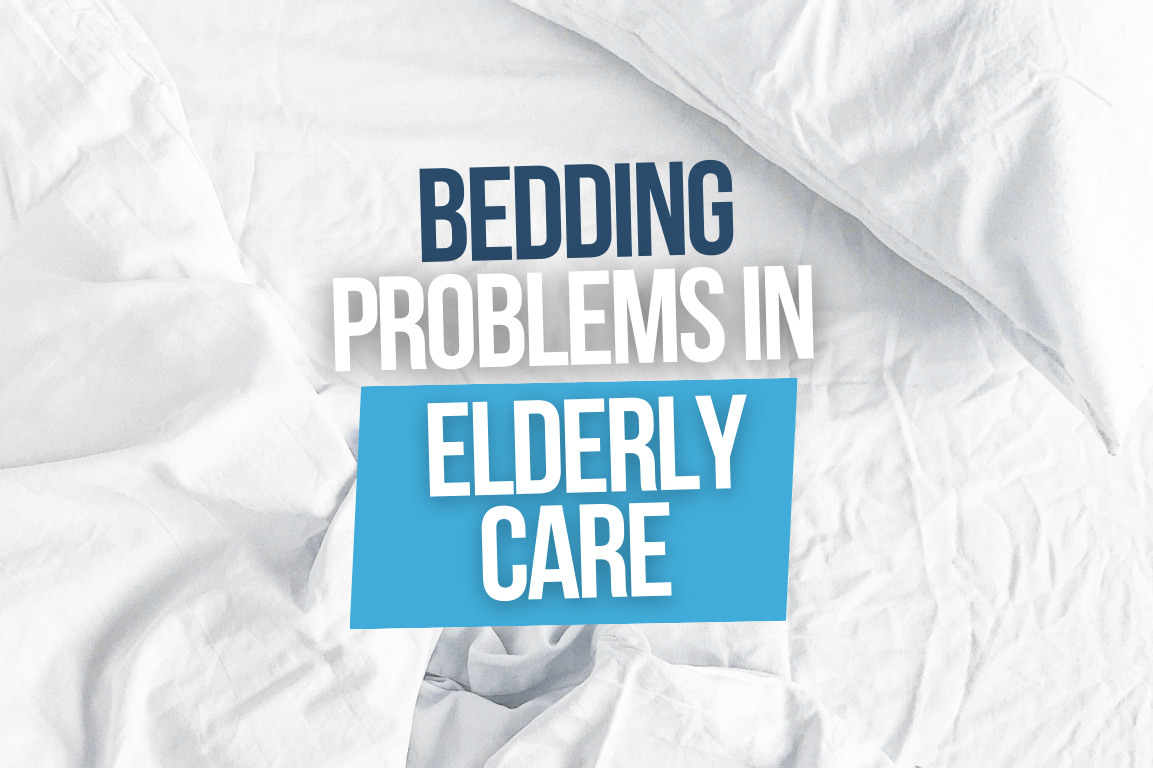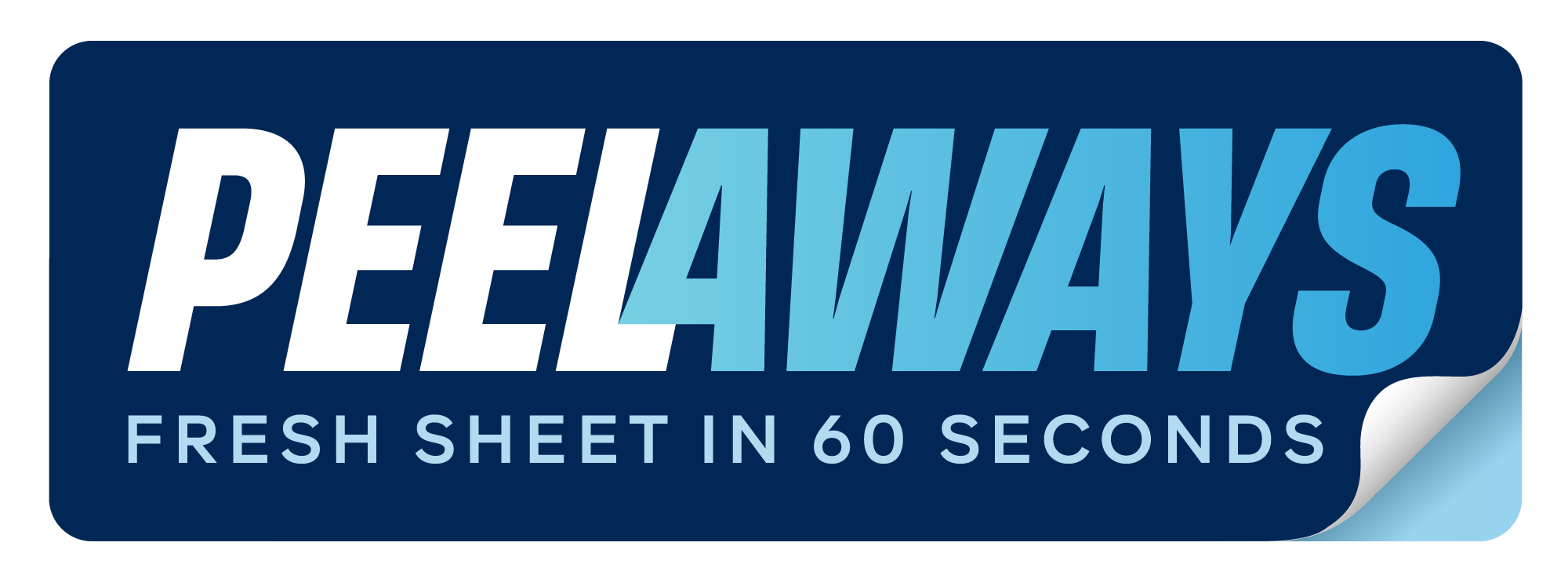Common Bedding Problems in Elderly Care

Elderly care often comes with unique bedding challenges that impact both caregivers and seniors. Issues like moisture control, improper fit, and skin irritation can affect comfort, safety, and hygiene. Here's a quick breakdown of common problems and solutions:
- Incontinence and Moisture Control: Accidents can lead to skin issues, odors, and hygiene concerns. Multi-layer disposable sheets, waterproof mattress covers, and breathable fabrics offer practical solutions.
- Poorly Fitting Bedding: Ill-fitting sheets can cause tripping hazards, skin irritation, and discomfort. Opt for deep-pocket sheets, anti-slip materials, and proper mattress measurements.
- Skin Health: Fragile skin is prone to irritation from rough fabrics or trapped moisture. Hypoallergenic, breathable materials help protect skin and regulate temperature.
- Caregiver Strain: Changing bedding for individuals with limited mobility can be physically demanding. Multi-layer systems simplify cleanup and reduce caregiver fatigue.
Incontinence and Moisture Control Issues
Incontinence is a common challenge for many seniors, often leading to frequent bedding changes. For caregivers, managing this requires constant attention - not just for cleanup but also for controlling moisture to prevent health issues and maintain the individual’s dignity. This creates hygiene challenges that call for practical and effective bedding solutions.
How Incontinence Affects Bedding Hygiene
When accidents happen, moisture can seep through sheets and into the mattress, creating a breeding ground for bacteria and unpleasant odors. This can result in skin irritation, rashes, pressure sores, and even infections - especially for those with diabetes or weakened immune systems.
The financial strain of incontinence is another concern. Replacing mattresses or specialized beds due to repeated accidents can be expensive. On top of that, the physical effort required to handle and clean heavy, wet bedding can quickly overwhelm family caregivers. Traditional cleanup methods, like stripping and washing bedding, often disrupt sleep and daily routines, adding to the stress.
Multi-Layer Disposable Sheets for Quick Changes
Layered protection systems provide a practical way to manage both immediate cleanup and long-term bedding care [1]. The key is to set up multiple protective barriers before accidents occur.
Start with a zippered, vinyl waterproof mattress cover directly on the mattress [1]. This acts as the first line of defense, preventing moisture from soaking into the mattress. Adding a softer, waterproof mattress pad on top enhances comfort while maintaining protection.
PeelAways takes this concept further with its patented multi-layer disposable fitted sheets. These sheets include 5 to 7 waterproof layers, with Twin XL and Cot sizes offering 7 layers for extended use. When an accident occurs, caregivers can simply peel off the soiled top layer to instantly reveal a clean sheet underneath - no heavy lifting or immediate laundering required.
For extra protection, consider placing underpads strategically. A large, washable waterproof underpad can go over the fitted sheet, with a disposable pad layered on top to catch leaks quickly.
Temperature regulation is another important factor. Using multiple lightweight blankets instead of a thick comforter improves airflow and makes laundry easier when accidents happen.
Effective moisture control is essential for maintaining hygiene and easing the workload for caregivers. Layered systems like these offer a practical approach to managing incontinence in elderly care.
Bedding Size and Fit Problems
When it comes to senior care, poorly fitting sheets can pose serious risks. They can lead to tripping hazards, disrupt sleep, and make caregiving tasks unnecessarily difficult. Just as managing moisture is crucial, ensuring bedding fits properly is equally important for safety and comfort.
Problems Caused by Poorly Fitting Bedding
Poorly fitting bedding can create several challenges:
- Tripping and entanglement hazards: Sheets with excessive overhang can become a tripping danger, especially during bed transfers [2][7].
- Slippery fabrics: Materials like silk or satin can increase sliding risks, making transfers less stable [2][6].
- Shifting and bunching: When sheets lack deep pockets or don’t fit securely, they can wrinkle or bunch up, causing pressure points that irritate the skin [3][4][5].
Selecting Correct Bedding Sizes for Elderly Care
To address these risks, choosing the right bedding size is essential.
Start by measuring the mattress, including its length, width, and depth (don’t forget to factor in toppers) to ensure a snug fit [3][6].
- Deep pocket fitted sheets: These are a must for keeping sheets secure throughout the night. Look for options designed to fit standard mattresses as well as thicker medical mattresses. For example, PeelAways offers sheets in various sizes, including Cot and Twin XL, with layered designs for convenience.
- Anti-slip materials: Opt for cotton or cotton blends instead of slippery fabrics like silk or satin. These materials provide better grip and stability [2][6].
- Taut sheets: Use techniques like hospital corners to keep sheets smooth and prevent bunching. Adding a toe pleat in the top sheet can also allow for better foot movement and reduce pressure points [4][5].
- Edge management: Choose bedding that fits snugly without excessive overhang. Sheets should tuck securely without leaving extra fabric that could lead to tripping hazards [2][3].
Properly fitted bedding not only improves safety for seniors but also makes life easier for caregivers. Sheets that stay in place simplify bed changes and make transfers safer, streamlining everyday care routines.
Skin Comfort and Health Concerns
Bedding does more than just provide moisture control and a snug fit - it plays an important role in protecting skin health. For aging individuals, whose skin becomes increasingly fragile, the right bedding can prevent irritation, enhance comfort, and reduce the risk of pressure sores and other skin-related issues.
How Bedding Affects Skin Health
As we age, our skin naturally loses elasticity and becomes thinner, making it more vulnerable to damage from friction and pressure. This means that bedding materials can either protect or harm delicate skin.
Rough or synthetic fabrics can be especially problematic. Fabrics like polyester or low-quality cotton blends often have coarse textures that can irritate or even damage sensitive skin, particularly for seniors who are less mobile. Constant friction from these materials may lead to rashes or friction burns.
Chemical treatments in bedding are another concern. Some sheets are treated with chemicals that can cause allergic reactions, resulting in redness, itching, or contact dermatitis. For those with sensitive skin, these treatments can lead to significant discomfort.
Moisture retention is a major issue for aging skin. When moisture gets trapped against the skin, it creates a breeding ground for bacteria and can weaken the skin's natural barrier. Traditional waterproof mattress protectors, while effective at blocking liquids, often trap heat and humidity. This can lead to maceration - a condition where overly softened skin becomes more prone to damage.
To address these challenges, hypoallergenic and breathable fabrics are key. These materials protect fragile skin while allowing airflow and reducing irritation. For example, PeelAways uses soft, breathable fabrics in their multi-layer sheets, providing gentle protection while ensuring waterproof coverage.
Addressing Night Sweats and Overheating
Temperature regulation is another critical factor in maintaining skin health. Many elderly individuals struggle with overheating and night sweats, which can lead to discomfort and skin complications.
Traditional waterproof bedding often exacerbates overheating by trapping heat and moisture. When bedding creates a barrier that holds in warmth, it can increase discomfort and make skin more vulnerable to damage.
Moisture-wicking fabrics are essential for keeping sleeping temperatures comfortable. These materials allow air to circulate, helping to regulate body temperature while still offering liquid protection. The goal is to find fabrics that repel liquids but let vapor escape, creating a more breathable sleep environment.
Multi-layer bedding systems provide an innovative way to manage temperature and moisture. Instead of relying on a single thick, heat-retaining layer, these systems use multiple thin, breathable layers to protect the mattress while allowing air to flow. PeelAways' patented multi-layer design is an excellent example, offering waterproof protection without sacrificing breathability.
Quick and easy bedding changes are also crucial for managing night sweats. For seniors and caregivers, changing bedding in the middle of the night can be both disruptive and physically demanding. Bedding solutions that allow for rapid cleanup without disturbing the entire setup ensure comfort and uninterrupted sleep. This approach not only simplifies care but also helps protect fragile skin by addressing temperature and moisture concerns effectively.
sbb-itb-45288fe
Caregiver Challenges with Bedding Changes
Changing bedding for elderly individuals with limited mobility goes beyond the usual housekeeping tasks. Caregivers often deal with physical strain, time pressures, and safety concerns, making this routine chore feel especially daunting.
Difficulties Changing Bedding for Bedridden Seniors
For seniors who are bedridden, traditional bedding changes can be physically demanding. Caregivers frequently need to lift and reposition the individual, which can lead to back strain and muscle fatigue - especially for those working alone. Beyond the physical toll, handling soiled linens comes with the added risk of cross-contamination, creating another layer of complexity.
On top of that, the constant need to wash and replace soiled bedding adds to the workload, turning this task into a time-consuming and exhausting cycle. These hurdles highlight the need for practical solutions that ease caregiver strain while preserving the dignity of the patient.
Efficient Bedding Change Methods
To address these challenges, PeelAways offers a multi-layer bedding system that simplifies the process. With this system, caregivers can quickly peel away the soiled top layer to reveal a clean, dry sheet underneath - eliminating the need for heavy lifting and reducing the time spent repositioning patients. This approach not only saves effort but also makes the entire process safer and more manageable.
Conclusion: Selecting Bedding for Elderly Care
Choosing the right bedding can make a world of difference in improving comfort for seniors and making life easier for caregivers.
Good bedding should tackle key concerns like hygiene, comfort, proper fit, and ease of use. Look for options that reduce physical strain, offer waterproof yet breathable materials, and help cut down on laundry while minimizing the risk of cross-contamination.
Make sure the bedding fits securely on any bed size, whether it’s Twin XL, crib-sized ($30.99), or King-sized ($53.99). A snug fit prevents bunching and ensures the bed stays comfortable and safe.
A standout feature is the multi-layer peel-away design, which allows caregivers to quickly remove soiled layers and reveal a clean sheet underneath. This not only saves time but also reduces heavy lifting and laundry loads.
To make long-term care more convenient, options like a 15% subscription discount, a 30-day money-back guarantee, and free shipping on orders over $100 add extra value.
Ultimately, select bedding that streamlines care routines while maintaining the comfort and dignity every senior deserves.
FAQs
What are the best ways to manage bedding for seniors with incontinence?
Managing bedding for seniors dealing with incontinence calls for practical solutions that prioritize both hygiene and comfort. Essentials like waterproof mattress covers, absorbent pads, and disposable incontinence products (such as underpads) can help protect the mattress while keeping the bed dry. These items serve as a barrier, preventing moisture from soaking into the mattress and reducing skin exposure to dampness.
For an added layer of convenience, products like Peelaways disposable bed sheets can be a game-changer. These sheets come with multiple peel-away layers - when one layer becomes soiled, you simply peel it off to reveal a fresh, clean layer underneath. This reduces the need for constant laundry and helps minimize the risk of cross-contamination. Regularly changing the bedding and ensuring it fits properly is also key to maintaining dryness, preventing skin irritation, and providing a comfortable, dignified sleeping experience for seniors.
What are the best bedding materials to keep elderly individuals comfortable and protect sensitive skin?
The best bedding materials for older adults focus on comfort, breathability, and maintaining healthy skin. Natural fibers such as organic cotton, bamboo, and TENCEL™ stand out because they’re soft, hypoallergenic, and gentle on sensitive skin. These fabrics also excel at wicking away moisture, which helps keep the skin dry and reduces the risk of irritation.
For caregivers, practical solutions like Peelaways can make a big difference. These disposable, waterproof bed sheets come with multiple peel-away layers, allowing you to quickly swap out soiled sheets without the hassle of lifting the mattress or doing laundry. This design not only saves time but also helps maintain a clean and hygienic sleeping space, reducing the chances of cross-contamination.
How does the peel-away bedding system make changing sheets easier for caregivers?
The peel-away bedding system makes changing sheets effortless by letting caregivers remove a soiled layer in just seconds - no need to lift a mattress or swap out the entire sheet. This clever design helps reduce physical strain, saves time, and makes caregiving a bit easier.
Featuring multiple soft, absorbent layers, this system allows caregivers to simply peel away the top layer to reveal a fresh, clean sheet underneath. It’s a smart way to maintain comfort and hygiene for loved ones while cutting down on effort and stress.
Related Blog Posts
- 7 Tips for Preventing Skin Irritation from Incontinence
- Why Organic Waterproof Bedding Matters for Incontinence Care
- How to Choose Bedding for Incontinence Care
- How Moisture-Wicking Sheets Help Prevent Bed Sores
Comments
0

SAVE MONEY & WATER
Professionals & Institutions save a fortune on labor/laundry.

SUPERIOR COMFORT
The first thing our customers notice is how soft our sheets are.

100% WATERPROOF
Each layer is 100% Waterproof, perfect for spills and accidents

SAVE TIME
Change the sheet in under 1 minute without stripping the bed.




Leave a comment